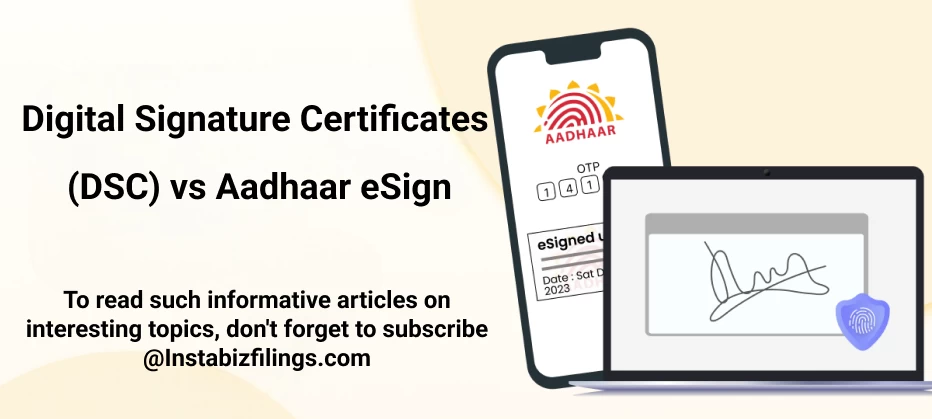
Digital Signature Certificates (DSC) vs Aadhar eSign
May 8, 2025 by Team Instabizfilings
Introduction
The current digital era demands secure, verifiable, and legally compliant digital signatures. In India, the legal electronic signature options consist of Digital Signature Certificates (DSC) and Aadhar eSign. The Information Technology Act from 2000 permits both methods but their implementation needs along with usability features, exhibit distinct characteristics. People and organisations can maximise their compliance as well as optimise convenience and minimise costs by learning to apply these options correctly.
What is a Digital Signature Certificate (DSC)?
A Digital Signature Certificate is a physical or digital file issued by a Certifying Authority (CA) under the Ministry of Electronics and Information Technology (MeitY). Authentication of document signatures along with signatory identification occurs through hash functions due to their ability to verify both document integrity and identity authenticity.
Key Features:
-
Certified by licensed Certifying Authorities (e.g., eMudhra, Sify, NSDL).
-
Comes in USB token form (hardware) or cloud-based variant.
-
Valid for 1–3 years and renewable.
-
Requires KYC verification for issuance.
-
Classified into three types: Class 1, Class 2, and Class 3, depending on use case and verification level.
Use Cases:
-
The filing of income tax returns through ITR, both by businesses and individual taxpayers, serves as one of the government's digital services.
-
The Ministry of Corporate Affairs is responsible for the signature process for MCA forms application.
-
E-tendering coupled with e-procurement and e-auctions, requires a user to be equipped with a Class 3 DSC (Digital Signature Certificate).
-
Secure signing of PDF documents and contracts.
What is Aadhar eSign?
The Aadhar eSign service permits users to apply digital signatures to documents through Aadhar authentication by either using a one-time password or biometric verification. This method lets users create digital signatures through paperless instant operations.
Key Features:
-
The system links with the Aadhar number which belongs to the user.
-
Requires OTP or biometric authentication.
-
No physical token needed.
-
Used visa Application Service Providers (ASPs) like DigiLocker, NSDL, eMudhra, etc.
-
Valid for single transactions or time-limited sessions.
Use Cases:
-
Signing personal or corporate agreements.
-
Verifying identity for e-Governance services.
-
Financial institutions and insurance companies and telephone corporations enable instant digital signatures for their application forms.
-
Financial technology firms and government schemes such as PM-KISAN and EPFO use Onboarding as part of their operations.
-
Common in eSign gateways like DigiLocker or GSTN.
Comparison Table: DSC vs Aadhar eSign
|
Feature |
Digital Signature Certificate (DSC) |
Aadhar eSign |
|
Form Factor |
USB token or cloud-based |
Aadhar-based online system |
|
Authentication |
Password, token, and KYC verification |
Aadhar OTP or biometric |
|
Issuance Time |
1–3 days (including KYC) |
Instant (if Aadhar linked) |
|
Cost |
₹800–₹2,000 depending on class |
₹5–₹25 per transaction (volume-based) |
|
Legal Validity |
High (especially for government use) |
Valid under IT Act, 2000 |
|
Use Complexity |
Technical setup required |
Simple and user-friendly |
|
Best For |
Businesses, legal filings, B2B deals |
Individuals, B2C, retail signups |
Which to Use When?
DSC:
-
The entity you represent acts as a filing organisation that delivers statements to the MCA together with GST and Income Tax departments.
-
You take part in e-tendering or e-auction activities that need implementation of Class 3 DSC.
-
Digital signature execution for sensitive documents happens frequently in your work process.
-
Persistent identification along with long-lasting validity requirements exist in your situation.
Aadhar eSign:
-
A fast mobile signing solution addresses non-sensitive personal or business documents.
-
Remote document signing without hardware equipment is what you seek.
-
The digital customer onboarding process takes place at banks together with telecom organisations.
-
Your goal is to achieve authentication services at a minimal cost for one-time use.
Security and Compliance Considerations
DSC along with Aadhar eSign offer legal security however each system implements different approaches for protection.
-
DSC functions with a protected private key located either on a safe device or in digital storage.
-
Real-time verification using Aadhar identity is the verification method which Aadhar eSign operates.
Highly regulated data handling entities such as legal and financial organisations prefer DSC for its strong compliance features but high-volume lower-risk situations benefit more from the Aadhar eSign solution.
Conclusion
Business and legal requirements need the secure protection of Digital Signature Certificates but Aadhar eSign serves users by delivering quick digital signing capabilities. The appropriate signing method needs to be selected according to use-cases along with total volume, count of users and regulatory requirements. In many organisations, a hybrid approach—using both as per the context—is often the most efficient and cost-effective solution.
Disclaimer
The information provided in this blog is purely for general informational purposes only. While every effort has been made to ensure the accuracy, reliability and completeness of the content presented, we make no representations or warranties of any kind, express or implied, for the same.
We expressly disclaim any and all liability for any loss, damage or injury arising from or in connection with the use of or reliance on this information. This includes, but is not limited to, any direct, indirect, incidental, consequential or punitive damage.
Further, we reserve the right to make changes to the content at any time without prior notice. For specific advice tailored to your situation, we request you to get in touch with us.

Need more details? We can help! Talk to our experts now!
Start Your Business Registration – Talk to Our Experts Now!

Still Confused?
Talk to experts? Fill in the information and we will reach out in 24 Working Hours.

